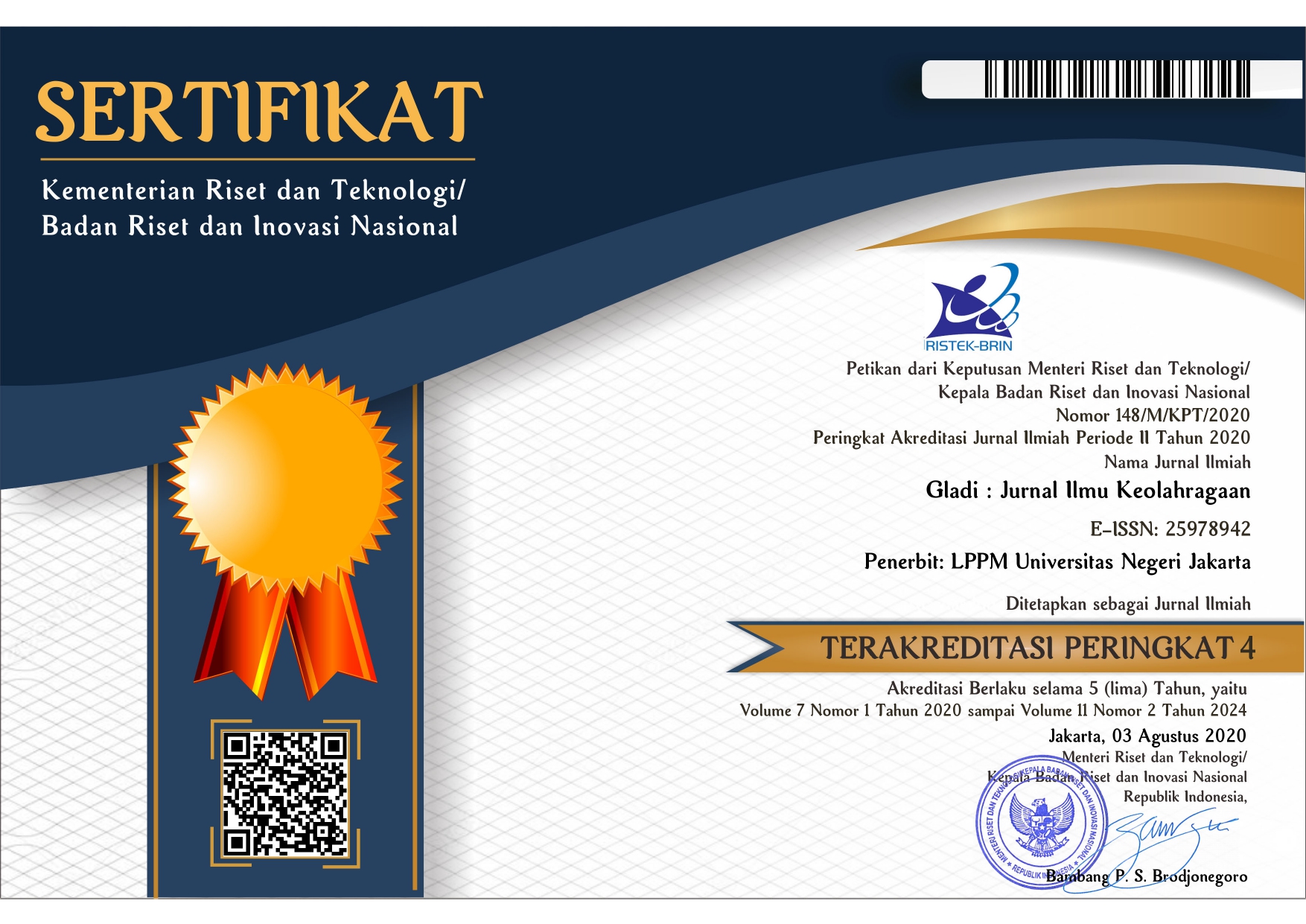Evaluation of the achievement development program of the dki jakarta province softball sports
Abstract
This research aims to obtain facts, data, and information about the results of the evaluation of the achievement coaching program for the women's softball sports of DKI Jakarta Province. This study used evaluative methods with the CIPP model. Data collection techniques use questionnaires, documentation, observations, and interviews. The subjects of this study are The Core Board, Coach, and Athlete. The results revealed that the context component of the Pengprov Perbasasi DKI Jakarta already has a long-term, medium, and short-term plan. However, the DKI Jakarta Provincial Women's Softball Team was only able to achieve the goal of the achievement coaching program at the 2018 Softball National Tournament. The input components, facilities, equipment, and equipment provided are enough to meet the needs of the DKI Jakarta Provincial Women's Softball Team. However, the need for supplements and vitamins for new athletes ahead of the implementation of PON. In the process component, the coaching staff implements a walking selection system and promotes and degrades athletes based on batting average data, left on base, running base in, accumulation of errors, & success in sacrifice. The training process was carried out face-to-face and virtually during the Covid-19 pandemic. In the product component, the results obtained by the DKI Jakarta Provincial Women's Softball Team during the period 2018 to 2022 were finalists in the 2018 Softball National Tournament. However, in the 2019 PON Qualification and PON XX Papua in 2021, the DKI Jakarta Provincial Women's Softball Team was only able to rank fifth
Downloads
References
Paoli, A., & Musumeci, G. (2020). Elite athletes and COVID-19 lockdown: future health concerns for an entire sector. Journal of functional morphology and kinesiology, 5(2), 30.
Cheval, B., Sivaramakrishnan, H., Maltagliati, S., Fessler, L., Forestier, C., Sarrazin, P., ... & Boisgontier, M. P. (2021). Relationships between changes in self-reported physical activity, sedentary behaviour and health during the coronavirus (COVID-19) pandemic in France and Switzerland. Journal of sports sciences, 39(6), 699-704.
Li, S., Wang, Y., Xue, J., Zhao, N., & Zhu, T. (2020). The impact of COVID-19 epidemic declaration on psychological consequences: a study on active Weibo users. International journal of environmental research and public health, 17(6), 2032.
Ammar, A., Brach, M., Trabelsi, K., Chtourou, H., Boukhris, O., Masmoudi, L., ... & ECLB-COVID19 Consortium. (2020). Effects of COVID-19 home confinement on eating behaviour and physical activity: results of the ECLB-COVID19 international online survey. Nutrients, 12(6), 1583.
Tison, G. H., Avram, R., Kuhar, P., Abreau, S., Marcus, G. M., Pletcher, M. J., & Olgin, J. E. (2020). Worldwide effect of COVID-19 on physical activity: a descriptive study. Annals of internal medicine, 173(9), 767-770.
Woods, J. A., Hutchinson, N. T., Powers, S. K., Roberts, W. O., Gomez-Cabrera, M. C., Radak, Z., ... & Ji, L. L. (2020). The COVID-19 pandemic and physical activity. Sports Medicine and Health Science, 2(2), 55-64.
Tingaz, E. O. (2021). The psychological impact of COVID-19 pandemic on elite athletes, management strategies and post-pandemic performance expectations: a semi structured interview study. IJERI: International Journal of Educational Research and Innovation, (15), 73-81.
Russell, A., Le Rossignol, P., & LO, S. K. (2000). The precision of estimating the total energy demand: implications for the determination of the accumulated oxygen deficit. Journal of Exercise Physiology Online, 3(2), 55-63.
Leyton-Román, M., de la Vega, R., & Jiménez-Castuera, R. (2021). Motivation and commitment to sports practice during the lockdown caused by Covid-19. Frontiers in Psychology, 3846.
Fitzpatrick, J., Sanders, J., & Worthen, B. (2011). Program-Oriented evaluation approaches. Program Evaluation: Alternative Approaches and Practical Guidelines. 4th ed. Upper Saffle River, NJ: Pearson Education, 153-71.
Copyright (c) 2023 Aryono Fajar Harianto, Ika Novitaria Marani, Susilo S

This work is licensed under a Creative Commons Attribution-ShareAlike 4.0 International License.







